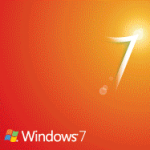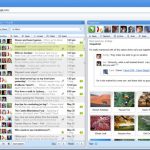The Windows 7 launch: The cultural event of the entire afternoon

Have you reserved your copy of Windows 7 yet? Did you book off work? Get a babysitter for the kids? Stock up on Red Bull and Doritos?...No? If you're one of the dozens who pine for midnight door-crasher sales at the electronics big box store and Rolling Stones-themed launch events, you may want to make alternate plans.
For anyone who doesn't live in a cave in Afghanistan (and even for a few folks who do), this week could be the most exciting one in an age as Microsoft launches its newest -- and possibly company-saving -- operating system, Windows 7, on Thursday. But 14 years after it redefined the rock-star launch party with Windows 95, and nearly four years after having invested a half-billion dollars selling us Vista, this time around, Microsoft is taking a lower-key approach.
How do you define performance?
![A chart showing the relative performance improvement of AMD's Dragon platform over its Spider, with each incremental addition of technology. [Courtesy AMD]](https://betanews.com/wp-content/uploads/media/23/2397-150x150.jpg)
System performance is an interesting concept; everyone seems to define it differently. To some, it involves chewing through a complex spreadsheet. To others, it's how fast a 3D video sequence can be rendered, or how easily Web pages are served up.
Call me a rebel, but after years of living off of a BlackBerry, my thinking has evolved. As much as I focused on megahertz and gigahertz for much of my computing life, the most important criteria for me these days are how fast the thing turns on, and how long it stays on before I have to recharge it.
Microsoft sends Danger signal by not taking full responsibility for Sidekick service failure

Microsoft should be lauded for doing what days ago seem miraculous: The recovery of Sidekick service data lost sometime last week. But Microsoft has failed to take responsibility for the data disaster, in statements issued publicly and given to the Los Angeles Times. The company's pass-the-buck position is simply inexcusable. Sole responsibility falls on Microsoft, because Danger is the company's subsidiary.
As Betanews' Scott Fulton reported earlier, Microsoft took credit for the data recovery, but not its loss. A Microsoft spokesperson told the LA Times that "the Danger Service platform, which experienced the outage, is a standalone service operating on non-Microsoft technologies, and is not related to Microsoft's cloud services platform or Windows Live." She continued: "Other and future Microsoft mobile products and services are entirely based on Microsoft technologies and Microsoft's cloud service platform and software."
Mac fanboys should get a life and some Windows 7 common sense

I have to laugh at the sudden, slew of Mac bloggers taking swings at Windows 7 and asserting that Macs will continue to sell well after Microsoft's newest OS ships. Feeling a little defensive are we, bros? Their reaction shows worry that the thing they profess against -- surging PC sales that swamp Macs -- may yet be reality.
Windows 7 is simply Microsoft's best operating system ever. Mac fanboys should worry and circle together in defensive posture. Collectively, they're making a last stand against the PC giant. Please, please, boisterous Mac defenders, stand in the front lines and receive the first blows. You deserve them.
Danger signs: Now how secure does the cloud look?

There are service outages, and then there are service outages. T-Mobile customers who carry the Sidekick smartphone are learning the hard way that there's a major difference between having no access to a service for a little while and losing every contact, calendar entry, and related shred of personal data they've got.
In the not too distant past, Google, Twitter, and Facebook have all experienced basic, quaintly simple service outages. Despite the headlines and general chaos associated with each incident, the bottom line impact was never all that onerous: When service returned, so did their users' data. For the most part, users were given an easy excuse to take a few hours off. And with the exception of Google's subscription services, most were free, so folks couldn't argue that they weren't getting their money's worth.
Should you trust Microsoft with your data?

That's probably not a hard question for many Sidekick users to answer, given recent events. If you're a Sidekick user, please offer your answer -- or your experience during the week-long data crisis -- in comments. I ask the same of everyone else. Answer in comments the question: Should you trust Microsoft with your data?
Every existing or potential Microsoft cloud computing customer should ask and answer that question following the Sidekick data loss fiasco. How could Microsoft potentially lose all Sidekick user data? What? There was no server backup? It's not like Microsoft is inexperienced hosting data. The company bought Hotmail over a decade ago. Windows Live is all about hosted data.
The roots of all evil: Apple, Google, Intel, and Microsoft
Facing down irrelevance: What Palm can learn from RAZR

The half-life of any piece of modern electronics, which was once measured in years, is now barely a few months. It's no one's fault, of course, but it's a reality that vendors need to integrate into their own life cycle planning lest they get caught with the product line equivalent of grandma's wardrobe.
Simply put, the half-life of today's uber-hot phones is shrinking. Fast.
I would rather cut bait than be phished in Hotmail's waters

Nagging Capital One credit card commercials ask, "What's in your wallet?" Perhaps for the connected age, the question should be "What's in your digital wallet?" If the answer is a password used at Windows Live Hotmail and pretty much everywhere else online, your wallet may have been stolen.
As reported earlier today by Neowin, on October 1st someone briefly posted online thousands of Hotmail (e.g., Windows Live) account passwords. The number of pilfered accounts could be much higher. The source of the accounts information remains uncertain, although Microsoft claims they were gathered through phishing expeditions. I decided not to wait to find out.
Sitting out Google Wave

I've decided I won't be part of the 100,000 or so special folks who are already rolling up their sleeves and digging into the guts of Google's newest uber-desirable online application, the private beta of Google Wave. This will give some poor fellow extra opportunity to troll eBay, bidding $100 or so for an invitation.
It's not like I'm eschewing some exclusive community. Like Gmail before it, Google Wave accounts will eventually be freely available to anyone with a pulse. But unlike Gmail -- which remains in the limelight with regular updates delivered to a widespread base of users who passionately use the service -- Google Wave's lifespan likely won't be as charmed.
The virtual mega-mart: Apple's oversized App Store

By all definitions, Apple's iTunes App Store is a massive success, with sales numbers that would make McDonald's franchisees green with envy. Two billion applications -- half a billion in the last quarter alone -- have been downloaded since the store went live just over 14 months ago. With over 85,000 apps, it puts every mobile platform competitor to shame. The 125,000-strong iPhone Developer Program and successive evolutions of iPhone and iPod touch devices should keep driving growth for a while.
This is all obviously good for Apple, because a vibrant online App Store naturally drives demand for its high-margin hardware. And in the case of the iPhone, AT&T and other partner-carriers benefit from carrying a device whose sales are driven not only by desirable hardware, but by the ability to easily turn the device into pretty much anything the end user wants. The paltry few-thousand choices on Research In Motion's BlackBerry App World, or Palm App Catalog's even paltrier few dozen apps, end up serving as inadvertent advertisements for the iPhone.
Q: How essential is Microsoft Security Essentials? A: Does your door have a lock?

Today Microsoft released Security Essentials for free. I've been testing the software for the last month, and I'm nearly at a loss how to really review it. Either the software doesn't really work and my laptop is a malware whore, or Security Essentials works so well you just set it and forget it.
The software has never warned of any malware infection. It works silently and doesn't hog resources -- typically less than 6,000k memory, according to Task Manager. Next to perhaps AVG 8.5, I've never used anti-malware software that asked so little of me or my computer (Read Scott Fulton's take on Security Essentials).
Microsoft's Windows 7 House Party prep video is a real party pooper

Sometimes buzz is the last thing a company should want.
Microsoft's lame Windows House Party prep video is the rage of the Web right now -- and that's not good. I refrained from blogging yesterday but have been called to action. This morning, Interpret's Michael Gartenberg tweeted: "How have you not weighed in on the House Party videos? Are you just laughing too hard... We need some JW analysis here please." OK. OK. I'll break my silence.
Microsoft should dig into the WebKit to stop Google from framing IE

Internet Explorer is in a state of crisis so severe that Microsoft may yet lose most of the browser market territory claimed during the browser wars. Microsoft has no choice but to make a leap of development faith, by abandoning the IE rendering engine and releasing new WebKit-based desktop and mobile browsers. IE is a dead platform. It's long past time for Microsoft to end its "Weekend at Ernie's" behavior.
What a difference a decade makes. Ten years ago, Microsoft won the browser wars with Netscape, only to abandon the territory after Internet Explorer 6 launched. Many end users are still stuck in the IE 6 past, whether it's the browser directly or progeny Internet Explorer 7 or 8. According to Net Applications, IE 6 usage share is higher than either of the newer versions. Perhaps IE's market position would be better had Microsoft not let browser development lay idle until after Mozilla started working on Firefox about six years ago. AOL and Mozilla reignited browser development because of paid search -- that Google box -- as did several other software developers. AOL eventually gave up on Netscape, but Apple, Mozilla and Opera continued developing browsers.
Accounting rules shouldn't change to benefit Apple, other high-tech companies

The Financial Accounting Standards Board will make a grave mistake if it gives into Apple and other high-tech companies demanding a change to subscription accounting rules. FASB is preparing to vote on a rule change affecting GAAP (Generally Accepted Accounting Principles) versus non-GAAP accounting. Apple is on record as supporting the change, which would artificially boost the company's quarterly revenue and almost certainly its stock price. Some other companies, including Microsoft, could receive similar benefits.
Under current rules, companies defer subscription revenue. Since they deliver services over time, revenue is accounted for by X percentage every quarter. Microsoft has deferred revenue for years, but the numbers got really big starting in 2002, following the implementation of annuity volume-licensing contracts under Licensing 6. Four times a year, Microsoft states the total unearned revenue, how much deferred revenue it realizes as real revenue and how much more the company gains each quarter.
Recent Headlines
Most Commented Stories
BetaNews, your source for breaking tech news, reviews, and in-depth reporting since 1998.
© 1998-2025 BetaNews, Inc. All Rights Reserved. About Us - Privacy Policy - Cookie Policy - Sitemap.
